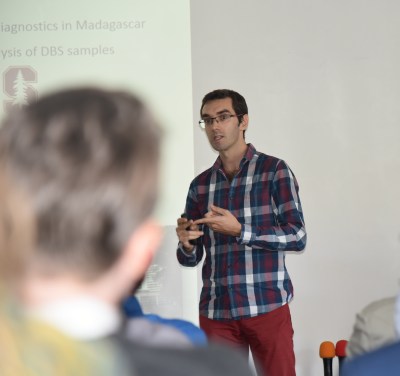20 May A Crucible For Planetary Health
On May 13, 2018, PIVOT and CENTRE VALBIO (CVB) co-hosted A Crucible for Planetary Health, a research symposium to explore unique opportunities for scientific discovery in the ecozone around Ranomafana National Park. Participants included world class scientists and experts who work on model systems at all scales – systems of organisms, of health care, of environments, of technologies, of big data – and are all applying their expertise in focus to this unique region.
Madagascar is one of the poorest countries in the world with the lowest spending on health care; it is also a biodiversity hotspot, where the precarious relationship between human development and conservation create extraordinary opportunities for advancing science and innovation in planetary health. Even more rare than the opportunity itself is having the right scientific and field conditions in which to explore the interrelated and seemingly intractable problems of poverty, disease, and environmental degradation.
That’s where PIVOT and CVB come in.
PIVOT is partnering with Madagascar’s Ministry of Health in Ifanadiana District to develop a model health system, and the district also includes Ranomafana National Park, a UNESCO World Heritage Site established by CVB Founder, Dr. Pat Wright. Both CVB and PIVOT have been working in partnership with the Madagascar government in ways that combine the highest standards of science with long-term investments in local communities. Because these initiatives co-exist in the same unique place, they create an opportunity for unprecedented study of the interface of human and environmental health.

Dr. Mark Krasnow
Conveners of the conference – Drs. Matt Bonds, Patricia Wright, and Mark Krasnow – structured the Crucible event’s dialogues around this framework of a model system.
Dr. Mark Krasnow of Stanford University shared the KRASNOW LAB’S work using mouse lemurs as a new model system for genetic organisms. Since he began this work nearly a decade ago in Ranomafana National Park, his team has screened hundreds of mouse lemurs using deep phenotyping to map the mouse lemur genome. In the conditions of this National Park, they have been able to advance an understanding of a new genetic model organism that spans the disciplines of medicine, conservation, and biology.
Innovators from the PRAKASH LAB and MEDIC MOBILE presented their plans to bring frugal science and mobile technologies to advance scalable health care solutions for austere environments. The Prakash Lab is best known for its Foldscope, an origami paper microscope that operates with the same quality as conventional microscope and costs less than $1 to make. With PIVOT and Ministry of Health clinicians, they have already tested the Paperfuge, a light-weight, hand-powered centrifuge modeled after the whirly-gig, and the Malariascope, an automated diagnostic for malaria designed for community health workers. Medic Mobile discussed their plans to deploy mobile phone technologies to improve the workflow and performance of community health workers, as well as opportunities for mobile data systems to revolutionize the granularity and timeliness of health care and disease surveillance data systems.

Dr. Andres Garchitorena
Dr. Greg Lanzaro and a team of researchers from the UC IRVINE MALARIA INITIATIVE and the Institute de Recherche pour le Développement (IRD) have honed in on Madagascar as a potential site to deploy Gene Drive technologies, which hold promise for eradicating malaria through genetic modification without eliminating the mosquito.
PIVOT and CVB’s unique opportunity is at the nexus of highly granular data systems on human health and environmental change. Combining ecological methodologies with crowdsourcing technologies, Drs. Andres Garchitorena (PIVOT/IRD) and Felana Ihantamala demonstrated an entirely new approach to determining geographic drivers of access to healthcare. PIVOT has used crowdsourcing to map over 1,000 miles of footpaths in Ifanadiana District, and is combining that with health care, topography, and satellite land cover data to better understand the impact of geography and the environment on health and access in space and time, ensuring our programs are optimized for impact.
Together, the Crucible consortium is working in a region where humans and environments are at once the most distinct and at-risk than any place on the planet. The work in Ifanadiana District has created a space where scientists and innovators can tackle these challenges from many dimensions simultaneously – from the molecular to the population level – and field test their proposed solutions on the ground. In affecting change in one of the world’s most complex systems in Madagascar, we are confident that lessons produced will have global impacts.
